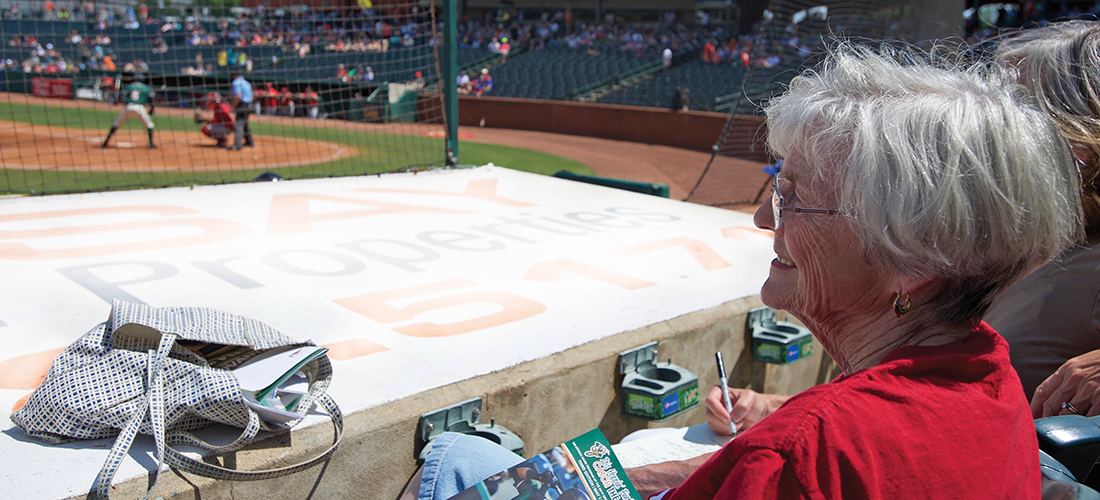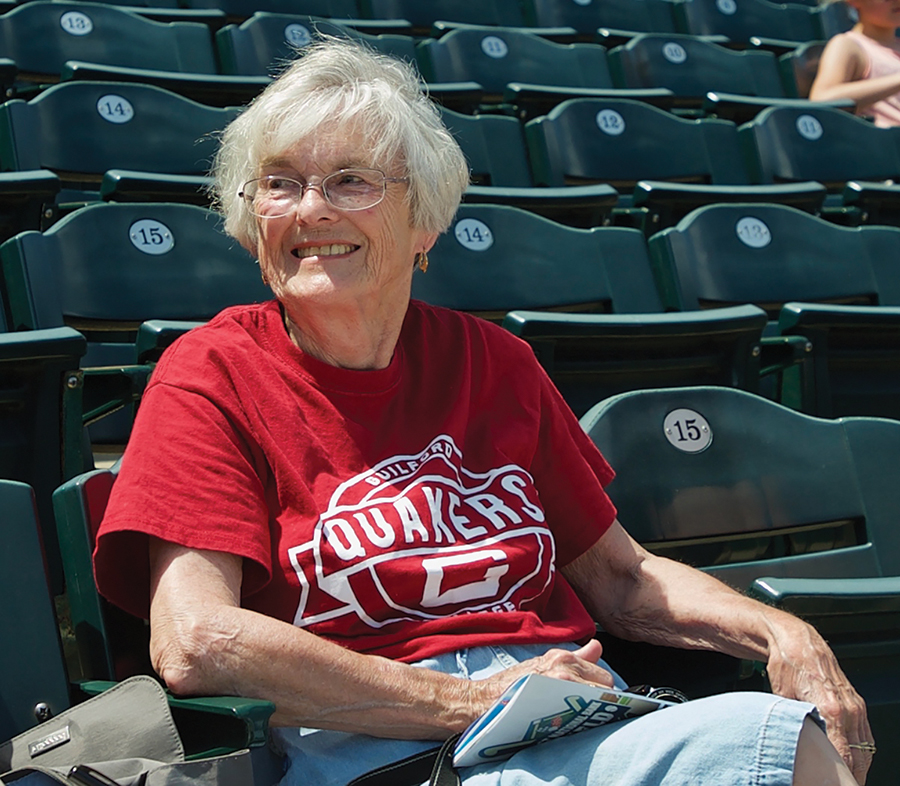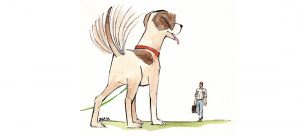
Joy resounds in the crack of a bat for Grasshoppers superfan Priscilla Tuttle
By Maria Johnson • Photographs by Sam Froelich
Priscilla Tuttle raises her fists, but not in anger.
She puts up her dukes to bolster her beloved Grasshoppers when they need it — as they do now, in the opening act of a daylight double header against the Lakewood BlueClaws, who’ve scuttled down from New Jersey.
It’s the bottom of the first, and the Hoppers, Greensboro’s minor league baseball team, are at-bat, down 1-nothing.
The BlueClaws pitcher unfurls a fastball that reverses sharply with a flash of ash. CRACK! A shooting star of hide arcs over the infield and lands in the grass. The Hoppers batter in bright white churns to first.
“Go-go-go-go-go-yeah-yeah-yeah-yeah-yeah-wooooooooo,” Tuttle croons from her usual seat in the first row behind the Hoppers dugout. She shakes her fists like baby rattles, though she’s far from the cradle.
At 78, she’s one of those women who subtracts years by answering the age question quickly.
She’s not afraid of stepping up to the plate.
Or guarding it, like she did when she was coming up in the textile town of Eden.
Her daddy worked at Fieldcrest Mills’ Draper blanket plant; he played catcher and shortstop for the mill team. Young Priscilla and her family watched the games at close range.
“Mama said my first black eye I got by a baseball when I was 3,” she says.
As a teenager in the 1950s, Priscilla followed the Dodgers — the Brooklyn Dodgers — on TV. She played catcher for her high school softball team. She used her daddy’s mitt, a hard brown doughnut made buttery in the middle by balls that numbed her left hand.
She threw right-handed, batted left, was a fair-to-good hitter and a scrappy defender who planted her featherweight frame over home plate whenever a girl rounded third.
“I tried to keep ’em from getting across that base. I got rocked a lot. That was in the old days,” she says.
Later in life, after she and her husband, Gray, had four sons, she and the boys played on occasional Sunday afternoons with a co-ed bunch from her Methodist church. Priscilla played catcher, again. She didn’t get bowled over nearly as much — thank you, Jesus, for Christians and small children at home plate— but she got charley horses from not warming up.
Dirt-and-fescue diamonds are rarely a girl’s best friend into middle age.
She quit the plate and exercised by chasing her boys and minding the family store — The Barn Bait & Tackle — in an old tobacco barn on N.C. Highway 135 between Eden and Stoneville. That’s where she was working when a friend of the family — who was also a booster of the Greensboro Hornets, a predecessor of the Hoppers — walked in with some players in T-shirts and jeans.
It was 1991.
The booster-friend had worked it out with Gray’s uncle to let the players fish in the uncle’s pond. They stopped at the store for rods and reels and worms.
Priscilla fixed them up. That’s how it started, her long walk home to baseball.
She’d set up the players with bait and tackle, they’d talk, and naturally, they got to be friends. She invited them over to the house for supper.
She made regular food. Salisbury steak. Meat loaf. Green beans. Crowder peas. Creamed potatoes. Cornbread.
“They ate it all,” she says. “Lord have mercy.”
One day, one of the players asked Priscilla if she’d ever been to one of their games?
No, she said.
Why not? he asked.
She shrugged.
If I got you some tickets, would you go?
Sure, she said.
In 1993, she became a regular at War Memorial Stadium. Gray would go, too, when he could get away from farming tobacco and getting up hay.
Priscilla studied the game. She learned the fine points that had never dawned on her in high school: how hitters hit to certain locations in certain situations; how defenders shift on the field depending on who is at-bat; how every throw from the field is calculated to minimize damage.
Like most games, baseball was simple on the surface, complex underneath.
“It’s a finesse game,” she says. “I enjoy seeing ’em work it.”
It was more fun because she knew the players. She took their pictures, had double prints made at Winn-Dixie, laid out photo albums for herself and gave extra prints to the players to share with their families.
Somewhere, she knew, those players — most of whom were single and in their late teens or early 20s — had parents who worried about them. Priscilla wore out her Instamatic camera letting the unseen families know she was watching out for their sons.
She got new cameras, new lenses.

She made the transition from film to digital.
She grew and changed with the team, with the seasons.
She joined the booster club and pitched in to provide the players with picnics, household goods, and goody bags for road trips.
She adapted to the name changes — from Hornets to Bats in 1994, and from Bats to Grasshoppers in 2005, when the team moved to what’s now First National Bank Field.
She rolled with changing affiliations to major-league clubs.
She and Gray traveled to spring training in Tampa, Florida, when the team was aligned with the New York Yankees. They visited Jupiter during the reign of the Miami Marlins.
Just this season, the Hoppers divorced the Marlins and took up with the Pittsburgh Pirates, who eat grapefruit in Bradenton, Florida.
Priscilla was sorry to see the split. Marlin’s CEO Derek Jeter had played for the Greensboro Hornets in 1992 and ’93 before going onto stardom with the Yankees, and Priscilla was impressed by him and his parents. Good people.
But Jeter’s visit to Greensboro last season did not bode well, she says. He stayed in a skybox and did not acknowledge the fans.
“It looks like he would have come out of the box to meet the people,” she says. “There are a lot of people here who remember the old days.”
Maybe, she says, it was time for a change after all. The Marlins’ brass didn’t like the dog crates in the clubhouse. The bat-fetching pooches of Hoppers owner Donald Moore are longtime darlings of local fans, including Tuttle.
Soooo . . . fair thee well, Marlins.
“We like the Pirates,” says Priscilla, who has served as the president of the Hoppers booster club for, as she says, forever. “We like the Pirates just fine.”
It’s time for “Y.M.C.A.”
Youngsters in shorts mount the dugout roof in front of Tuttle. She moves her canvas tote bag to give them more room as they commence to making Village People of the crowd.
Tuttle, whose short blond hair yields easily to gray, stays seated, sings along and makes the letters with her arms. In her elastic-waist jeans and slip-on sneakers, she looks every bit the elementary-school substitute teacher that she once was — and the reading tutor that she still is.
Her red T-shirt advertises the Fighting Quakers of Guilford College. Her grandson, Dylan Tuttle, pitches and plays right field for the Quakers. He gets it — why his grandmother keeps baseball cards, baseball programs, baseball books and signed baseballs in clear plastic boxes.
He gets her poster of Yankees slugger Don “Hit Man” Mattingly, who, incidentally, also played in Greensboro, in 1980, on his way to the Show.
If anything happens to me, Priscilla has told Dylan, don’t let them throw this stuff away. You know what it means. Not that she plans on going anywhere anytime soon, she points out, other than to a Hoppers game.
“A lot of things make me happy, but with this, I enjoy sitting and watching the plays. You sit here, and the cares of the day . . . it’s a way of focusing on something else,” she says.
“You can stay at home, in your little cluster, and never branch out, or you can go out someplace like this and meet people, and have a community. It’s just a joy. Except when we’re losing.”
We’re losing.
Have been since the error-filled fourth inning.
Now, it’s bottom on the seventh, the final inning of the foreshortened doubleheader.
Priscilla locks her blue-green eyes on the game. Her bifocal lenses are clear — not rose-colored — but her wire frames are rosy-gold. Hopeful around the edges.
We’re down 4-7 when the rally starts.
Siri doubles. Sanchez walks.
Men on first and second.
Macias singles, driving home Siri and advancing Sanchez.
Men on first and third.
“Oh! Go-go-go-go-go! Woooooooo.”
Priscilla’s fists are up.
The score is 5-7 when the first baseman Martin comes to bat. His mother might call him Mason, but to Priscilla, he’s Martin. She calls them by their last names. This is baseball.
Martin’s a lefty. Out of Washington state, Priscilla thinks. She’s still getting to know this Pirates team, making them her own.
“Let’s go, Hoppers! Let’s goooo,” she urges.
Four-hundred-and-eleven feet. That’s how far Martin pulls the ball. It sails over the ad-plastered fence and clonks off a building under construction on the other side of Eugene Street.
Martin knows it’s gone when he hits it. His slow trot around the bases gives time for everything to rise: The noise. The fans. The delirium of seeing the long shot made real.
Game over.
Hoppers win 8-7.
Priscilla Tuttle is on her feet, bouncing in her Skechers, yelling to be heard over the swell.
“Now, that’s what you call a baseball game.” OH
Maria Johnson is a contributing editor of O.Henry. Her email is ohenrymaria@gmail.com.





